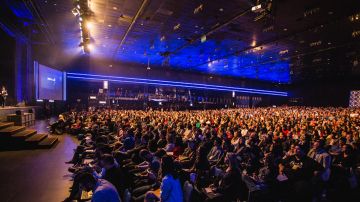NYC Afro-Latino Festival Pushes Conversation Beyond Identity With Three-Day Event
Of those in the room, who is willing to put your life on the line for this? Afro-Panamanian human rights consultant Janvieve Comrie Williams posed the question during an AfrolatinTalks panel on the first day of the Afro-Latino Festival of New York 2018

Photo: Unsplash/@samuelpereira
Of those in the room, who is willing to put your life on the line for this?
Afro-Panamanian human rights consultant Janvieve Comrie Williams posed the question during an AfrolatinTalks panel on the first day of the Afro-Latino Festival of New York 2018. The question echoes the current state of resilience among Afro-descendants in Latin America. In Colombia, for example, reports show there’s been a 45% increase in human rights leaders, many Afro-Colombians, killed between 2016 and 2017.
While the conversation around Afro-Latinidad gets fixated on identity within the states, for those beyond these borders, asserting African descent—and one’s rights—means life or death. It’s one of the reasons Mai-Elka Prado, co-founder and co-director of the Festival, and co-director and husband Amilcar Priestley chose the theme of “Identity and Beyond.”
“This year we look to expand the conversation around identity, as well as its implications for future cultural, socio-economic and political growth,” the Afro-Latino Festival notes on the website.
“We felt that the conversation on Afro-Latinidad had to be pushed,” Prado said in an interview with OkayAfrica. “We feel like the media only focuses on identity, so that’s why we’re focusing on everything that goes beyond it.”
Held at the Schomburg Center in Harlem, Friday’s panel discussions touched on topics that impact identity such as the intersection of social media and activism; migration and immigration, as well as the census, data collection and various terms of identity. Also included in Friday’s programming was the awards ceremony, which honored the late Afro-Brazilian queer politician and human rights activist Marielle Franco and Bernardo Cuero Bravo, former leader of the Asociación Nacional de Afrocolombianos Desplazados (AFRODES). Both sadly have been killed trying to fight for human rights. The ceremony’s keynote speaker, Urenna Best, Esq, director of the National Secretariat for Afro-Panamanian Development (SENADAP), received the Pioneers Award for her continued work with Afro-descendant leaders across Latin America, as well as UNICEF and the United Nations. Trailblazing Brazilian ballerina Ingrid Silva also received an award and opened up about her journey to the Dance Theater of Harlem during her one-on-one conversation with Marjua Estevez, Latin Content & Culture Editor, Tidal.
“Coming from where I come from, you have one chance literally of becoming someone,” said Silva, who’s from Benfica, in Rio de Janeiro, Brazil. When asked about the legacy she hopes to leave, the 29-year-old shared, “I want to open doors for more people—that’s what I want to be remembered for.”
The Liberación Film Festival, in association with Tap & Cork, at Abrons Center for the Arts in the Lower East Side opened day two of the event, showing Angelica, a film on how an Afro-Puerto Rican woman navigates colorism in her family, and drug trafficking drama Manos Sucias; documentaries and various short films like NEGRO: A Docuseries on Latino Identity (2012) by Dash Harris and AFROFUTUROS by Mikey Cordero and Eli Jacobs-Fantauzzi of Defend Puerto Rico, which debuted at the festival.
Capping off the weekend in Brooklyn, at The Well, Love and Hip-Hop: Miami star and Afro-Dominican performer Amara La Negra rocked the stage as the headliner. While international acts like Colombian hip-hop duo Profetas also hit the stage, Brooklyn’s own Latasha got the crowd rocking at the outdoor venue. It was also an opportunity to support vendors and entrepreneurs within the community.
While the sixth year just came to a successful close, Prado already has her eyes set on next year’s festival.
“I can’t wait to see what that conversation is going to be about,” she shared in an interview with HipLatina. Prado wants to continue creating a space where collective support can take place. “I want to see people exchanging talents, creating collectively, supporting each other’s projects; that’s what I wish for everybody to do.”
She wants creatives to work and build their projects, individually, but also support the collective. “Independientemente pero tambien as a community.”

















